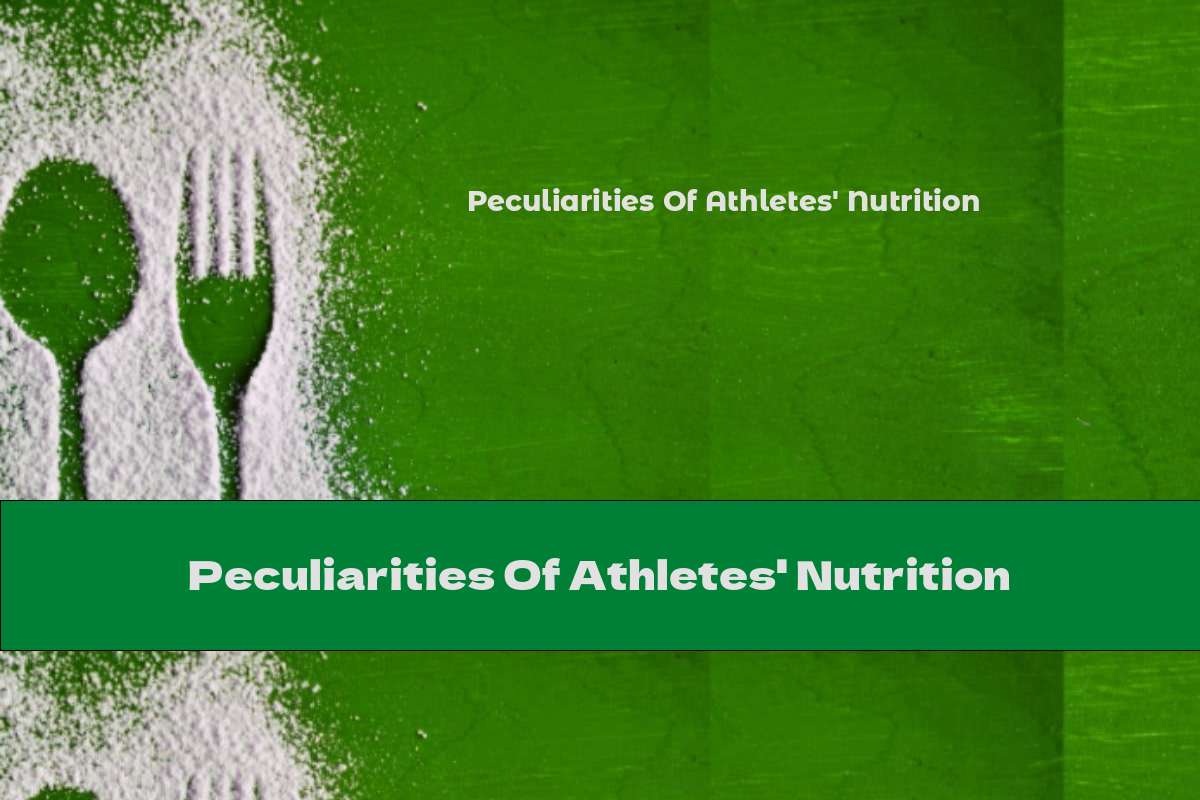Peculiarities Of Athletes' Nutrition
 Author: Joe Fowler
Time for reading: ~12
minutes
Last Updated:
February 16, 2026
Author: Joe Fowler
Time for reading: ~12
minutes
Last Updated:
February 16, 2026

CHAPTERS (Table Of Contents)
Nutrition plays a very important role in the training of highly qualified athletes. The athlete's diet should fully ensure the body's consumption of energy and nutrients during physical exertion, constantly maintain work capacity and a high level of sports training, and also ensure the fastest possible recovery of the body
Nutritional requirements of athletes
The physical and neuropsychological stress on the athlete 's body during training and competitions is much higher than on the body of an ordinary person in the conditions of everyday activities. For some reason, when playing sports , all metabolic processes are more intense, and the body needs more energy and nutrients.
Sports nutrition is a must
- To fully ensure the consumption of energy and nutrients.
- Constantly support and improve sports performance.
- Stimulate recovery processes after competitions and training.
This can be achieved by increasing the content of carbohydrates and proteins in the athlete's daily diet and somewhat limiting the amount of fats. The ratio of protein: fats: carbohydrates should be equal to 1: 0.8: 4 (5). (For people who do not do sports , it is 1 : 1 : 4). The increased need for proteins is due to the more intensive development of the muscles of a person engaged in sports and the increased breakdown of proteins during physical exercise of the muscles.
Energy expenditure of the human body (per 1 kg of weight)
- Sleep — 0.9 kcal/min.
- Slow walking — 2.76 kcal/min.
- Running 60 m — 39 kcal/min.
- Running at a speed of 400 m/s — 45 kcal/min.
- Cross-country skiing 8 km/h — kcal/min.
- Swimming 50 m/min — 10.2 kcal/min.
- Throwing — 11.0 kcal/min.
The most optimal is a four-time diet for athletes with the following caloric distribution:
- 25-30% - breakfast.
- 30-35% - lunch.
- 15% - after-party.
- 25-30% - dinner.
It is recommended to consume food at least 2 hours before the start of training, 3.5 hours before the competition, and also after 30-40 minutes after the end of sports activities.
Nutrition of athletes can be different depending on the period and tasks of sports activities:
- The accumulation period is the basic nutrition in the conditions of normal training.
- Nutrition before competitions.
- The implementation period is during the competition.
Nutritional value of athletes' diets
Beginner athletes usually have less training load during the day than highly qualified athletes , because less energy is spent, and the daily rate of protein consumption is also reduced to 1.5-2 g/kg. However, regardless of the athlete 's specialization and qualification , 17% of the total caloric content of the diet should be provided by proteins.
As for the fat part of the diet, 80-85% should be animal fats, and the rest should be vegetable oils. Unsaturated fatty acids are very important for the athlete 's body , they are contained in vegetable oils. The largest amount of unsaturated fatty acids should be provided in the diet of athletes undergoing long-term intensive loads (for example, engaged in long-distance running, cross-country skiing, cycling, skiing, etc.).
The carbohydrate part of the sports diet should provide 65% of starch (complex carbohydrate) and 36% of simple sugars (sugar, glucose, etc.).
Related Articles
- The Ultimate Guide to Hickory Smoked Bacon in Nutrition and Healthy Eating
- Fruitskewers in Honey Syrup: Nutritional Benefits and Recipes
- The Ultimate Guide to Buffer 500 in Nutrition: Benefits and Usage
- Nutritional Benefits of Fruit Skewers in Honey Syrup: A Delicious and Healthy Recipe
- Nutrition Guide: Fruitskewers in Honey Syrup - Benefits, Recipes, and More
Top Nutrition Articles Today
- . Granadilla - Health Benefits
- . E481: Uses, Benefits, Side Effects, and Safety Regulations
- . Nutrition Trends 2026: Diet Plans, Recipes, and Wellness Tip...
- . Nutrition Trends for 2026: Superfoods, Recipes, and Balanced...
- . The Power of Nori: Health Benefits and Nutritional Value
- . The Benefits of Myra E: A Powerful Vitamin E Supplement
- . The Nutritional Benefits of Quaker Oats: A Complete Guide
- . The Role of Micronutrients in Chicken: A Comprehensive Guide
- . Carbs to Sugar Conversion Chart: Monitoring Carb and Sugar I...
- . The Ultimate Guide to Diet Powerade: Benefits, Flavors, and...